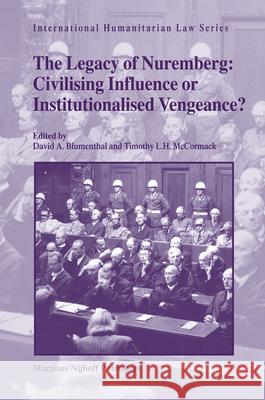The Legacy of Nuremberg: Civilising Influence or Institutionalised Vengeance? » książka
The Legacy of Nuremberg: Civilising Influence or Institutionalised Vengeance?
ISBN-13: 9789004156913 / Angielski / Twarda / 2007 / 337 str.
In this new collection of essays the editors assess the legacy of the Nuremberg Trial asking whether the Trial really did have a civilising influence or if it constituted little more than institutionalised vengeance. Three essays focus particularly on the historical context and involve rich analysis of, for example, the atmospherics of the Trial itself and the attitudes of German society at the time to the conduct of the Trial. The majority of the essays deal with the contemporary legacies of the Nuremberg Trial and attempt to assess the ongoing relevance of the Judgment itself and of the principles encapsulated in it. Some essays consider the importance of the principle of individual criminal responsibility under international law and argue that the international community has to some extent failed to fulfil the promise of Nuremberg in the decades since the Trial. Other essays focus on contemporary application of aspects of the substantive law of Nuremberg - particularly the international crime of aggression, the law of military occupation and the use of the crime of conspiracy as an alternative basis of criminal responsibility. The collection also includes essays analysing the nature and operation of a number of international criminal tribunals since Nuremberg including the permanent International Criminal Court. The final grouping of essays focus on the impact of the Nuremberg Trial on Australia examining, in particular, Australia's post-World War Two war crimes trials of Japanese defendants, Australia's extensive national case law on Article 1(F) of the Refugee Convention and Australia's national implementing legislation for the Rome Statute.











